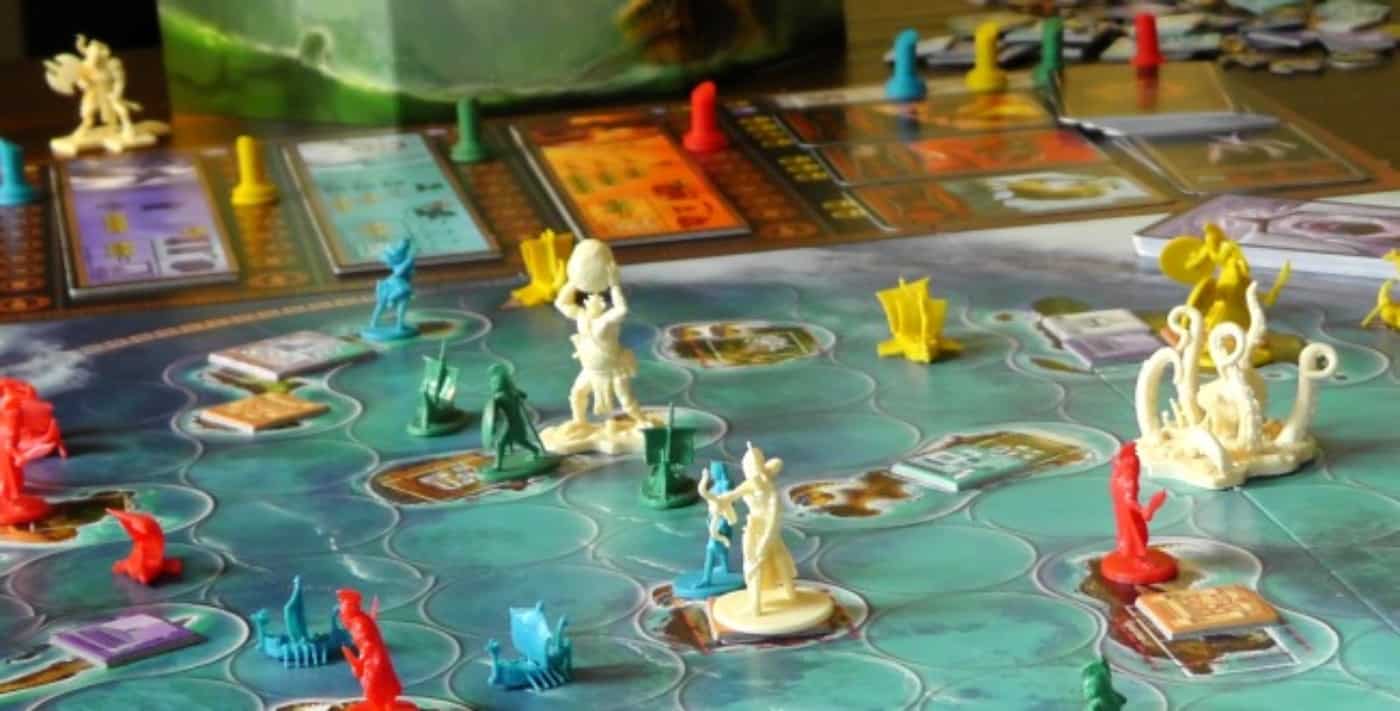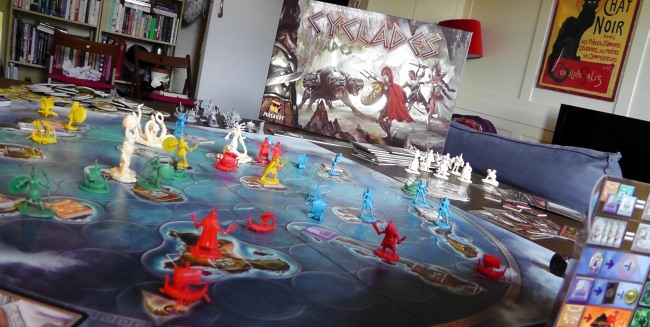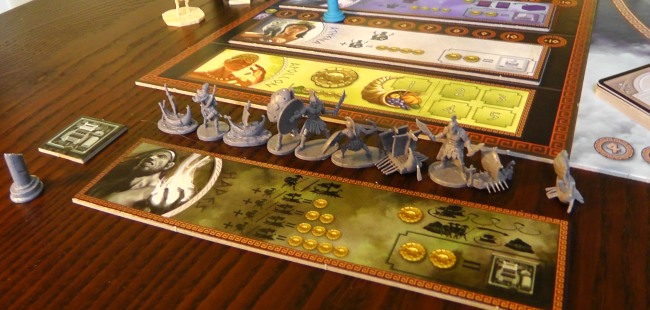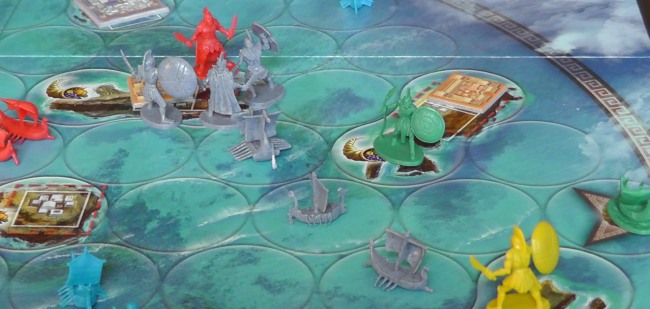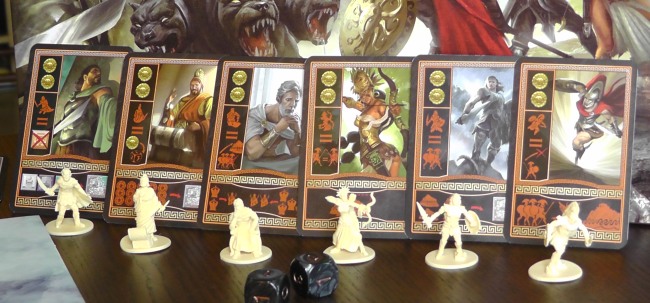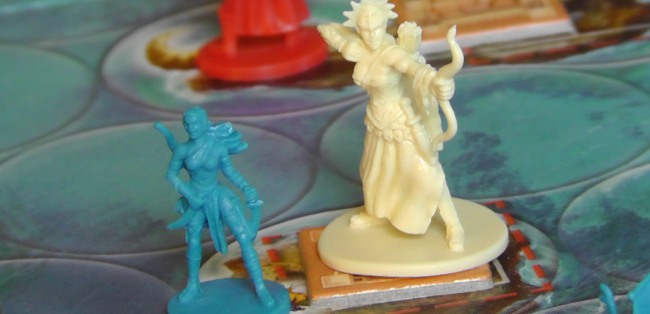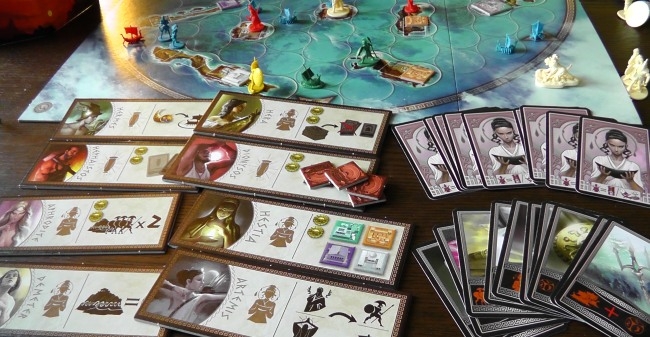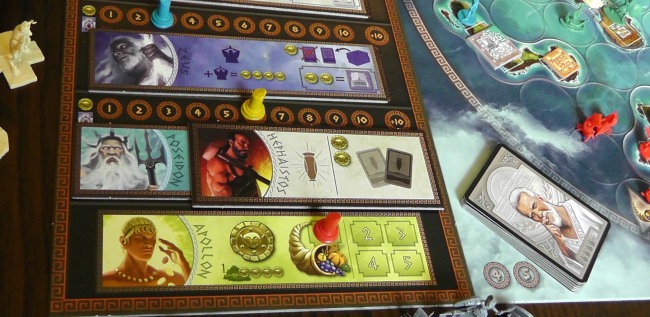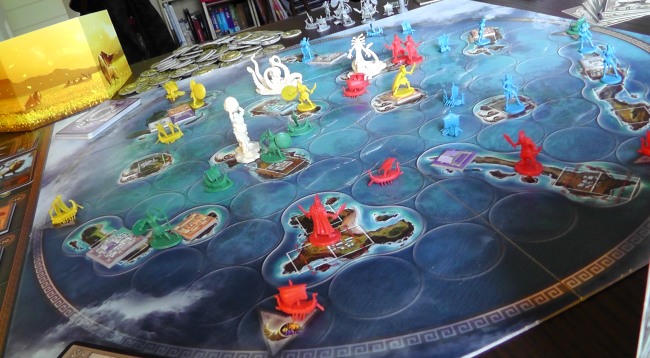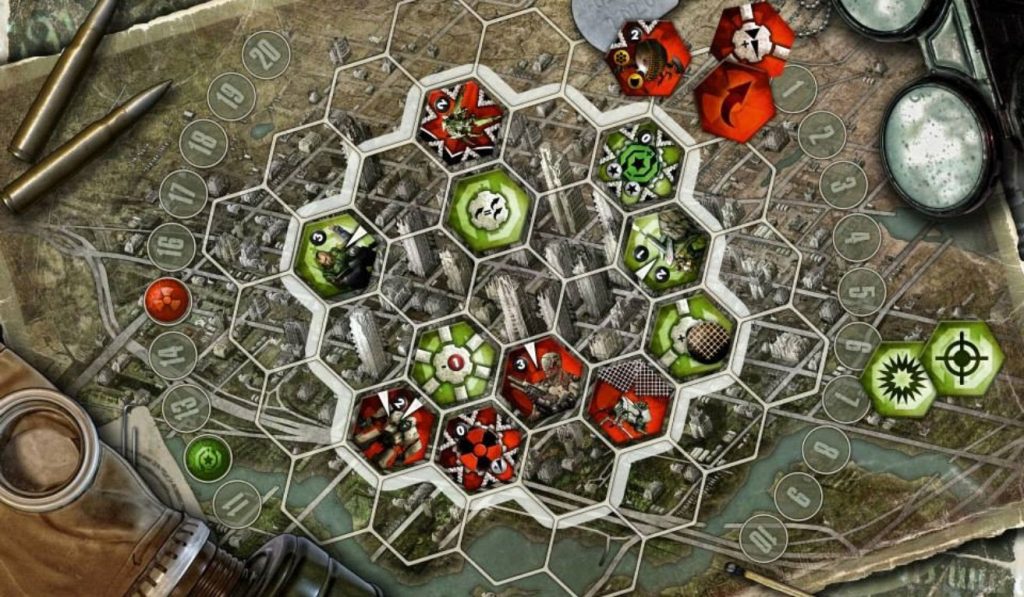Paul: Cyclades! We turned SU&SD’s unblinking, cyclopic eye to look at it back in Episode 3 of this season. It’s a deadly, brilliant wargame where everybody plays different coloured Greeks trying to build two cities. Just two.
Quinns: We’ll recommend it to anyone. Spartan rules envelope a design where everything anyone does is tragic, comic or heroic. The self-contained islands you duel across means any attack will wrest control of a territory from someone else (exciting!), or see the aggressor getting kicked back into the water (EXCITING!). But doing anything means bidding for the affection one of the game’s four Gods, an auction that’s every bit as vicious as the main board.
Paul: Each choice within Cyclades is a self-contained, Herculean challenge. Gods, armies, buildings and monsters tempt you at every turn in a game that’s very, very cleverly balanced.
Quinns: Immaculately balanced.
Paul: …So how the hell is an expansion set going to work? A new cog jammed into this tight little machine? A whole series of cogs, in fact.
Quinns: Say hello to Cyclades: Hades. Hello, and, perhaps, GOODBYE, as we decide whether it’s bobbins or a worthy purchase.
Paul: Hades introduces a new god to the game, Hades himself, god of underwear, and also tosses in a pantheon of supporting gods AND a catalogue of new heroes.
Quinns: Right. Cyclades: Hades contains three “modules” (four, if you count some new rules involving set up that get the strategy off to a 120mph rolling start), and it’s recommended you introduce each of them to your Cyclades games in order. Which is what we did! So let’s review them in order, too.
MODULE #1: HADES
Paul: A new god! That sounds quite creepy, doesn’t it? Like I’m trying to convert you to some weird new religion. Worshippers of Hades gain a host of exciting benefits, such as being able to recruit ashen undead warriors, make use of ghost ships and also build a Necropolis, which collects cash every time someone dies. Anyone. Anywhere.
Quinns: Just like my uncle.
Paul: What?
Quinns: He gets money any time someone dies.
Paul: Wha-
Quinns: Anyway, Hades isn’t like the other gods. Poseidon, Ares, Zeus and Athena govern your fleets, armies, economy and your cities, respectively. They’re reliable types. Hades shows up at random, once every few turns, and when he does the entire turn will revolve around him. The introduction of Hades gives the game a shot in the arm, though I’m not sure what’s in that shot, exactly.
Paul: Blood? Wine?
Quinns: I dunno. Anyway, our games have seen people bankrupting themselves to win Hades, at which point they can’t even do anything with him. They do this just to keep him out of someone else’s muscular hands.
Because YOU SEE, Cyclades is based around this fascinating mechanic wherein any invasion requires you to have fleets in place using Poseidon, then Ares to move your armies. Two agonising turns of plotting, before you can lash out. Hades? Hades can summon dead soldiers, dead boats and move them both. They crumble into so much muck and gristle at the end of the turn, but who cares? You’ll still control whatever territory they took.
Paul: He’s two gods combined, plus founding the Necropolis is like building a bank, which slowly fattens with the profits of war. He can give you the chance to bolster your army, attack immediately and ALSO benefit from the resulting carnage.
Quinns: I… yeah. That Cyclades: Hades kicks off with you introducing this guy, this bad time, this tremblesome menace into your game was my introduction to how the expansion inserts “new cogs into the machine”, as you say. Not without elegance, but with a certain amount of brute force.
Which I was totally disappointed by! I’d read online that this was some fantastic expansion that completes the game. Does it hell! Like how the sun completed Icarus, perhaps.
Hades is fun. He’s a big black cloud looming over Cyclades’ colourful scenery. But he’s also a SIGN OF MODULES TO COME. Cyclades is about planning. Hades? You buy him first and figure out what you can do with him later, which is backwards.
Paul: Hades definitely changes the dynamic. The moment he turns up in the bidding, you almost always drop the other gods like stones. What was previously a game of tightrope-tight balancing becomes, for a moment, a scramble. It’s, uh, not quite so elegant.
Anyway, next up we’ve got…
MODULE #2: HEROES! (And some more monsters.)
Quinns: HEROES!
Paul: HEROES!
Quinns: HEROES!
Paul: HE—
Quinns: That’s enough.
Paul: This expansion also introduces is a league of legendary gentlemen (and ladies), a dysfunctional team who stretch the definition of “hero” in all kinds of new directions. Midas, for example, is one of the new bunch, but would you really call him heroic? No matter, he brings new powers to the table and, like all the heroes in this box, he can grant you an enormous advantage.
Quinns: The heroes get inserted into the base game’s mythological creature deck like a bunch of consultants at the world’s weirdest job centre. Like the creatures, they show up each turn and can get snapped up by players, but unlike monsters, they #1: act as soldiers, #2: have a special power, #3: have ANOTHER power you can use if you sacrifice them and #4: have outrageous mortgages to pay off or some shit because they cost you a stack of cash every turn.
These guys can complicate Cyclades significantly. While there’s nothing random about them, every one that gets placed on the board means two extra powers to keep in mind. Two grinning, glistening traps for you to fall into.
Paul: You can see how the game becomes more complex without necessarily becoming more baroque or, to put it another way, elaborate without being elegant. Don’t get me wrong, the heroes are interesting and they present you some new routes to victory. If you’re ever able to bury Midas in cash, for example, he can instantly build you a city.
Quinns: Which is fun. As is using Perseus to perform a fighting retreat, or using Penthesilea to build a city off the board, on the secret island of the Amazons (and, more pertinently, out of mind of the other players). But… man! I don’t want to be a grump or anything, but this is yet more bangles and baubles that dress up the base game without making it stronger.
Paul: We’re used to everything in Cyclades being accessible, open to interference from everyone else, whether it’s the game’s bidding, its islands, its cities or buildings. While they have an upkeep cost, buying or maintaining heroes has a certain inflexibility to it.
Quinns: Yeah. They’re like reefs, or something. Sharp, antisocial additions to the board.
Let’s look at the third module. I bet that’ll turn things around! Oh Jesus why does it have such a long name
Paul: Jesus isn’t in it. Is he?
MODULE #3: PRIESTESSES, DIVINE FAVOURS & MAGIC ITEMS
Paul: Who can’t bring some change if it isn’t a boxful of gods, from Demeter to Dionysus? And what can’t empower this game, if not Pandora’s Box or Helios’ own Chariot of the Sun?
Quinns: I feel like I went on a date with a girl and she showed up
on a horse.
“Do you like my horse?”
“Why the hell do you have a horse?! Now we can’t get into the restaurant!”
“STOP SHOUTING AT ME.”
“YOU’RE CRAZY! I HATE YOU SO MUCH!”
The final module adds eight subgods that randomly attach to one of the base game’s four gods whenever Hades isn’t around, meaning the bidding is permanently mad. Aphrodite, Hermes, Dionysus, Artemis, Hephaetus, Demeter, Hestia, Hera, the whole gang’s here. And they all have special powers if you win them, AS WELL as giving you one of the new priestesses or magic items.
Priestesses can be used to encourage heroes and creatures to stick around. Best not think about how that works, exactly. Meanwhile the magic items, which are entirely random, each have their own power. Yet more powers, then. More powers than a geometry dissertation.
Pelops’ Scepter, which was actually the name of my metal band in college, lets you pull a random creature into your service. Aphrodite’s belt lets you stop a player from bidding on a God of your choice. Potentially game-winning stuff. If Cyclades wasn’t Ameritrash before, it definitely is by this point. Scheming is replaced by reacting, and predictability is bulldozed by surprises.
Paul: The thing is, I really like the idea of extra gods and extra powers. They seem like the most logical content for an expansion, and particularly as in the Greek pantheon these are all pretty SERIOUS BUSINESS gods, so it would make sense for them to have a starring role, and yet… I don’t feel they do. They piggyback on other gods and bring their divine whims into play, rather than more decisive, concrete choices.
Quinns: Whimsy! That’s the word for it.
I think the reason I’m being such a noxious grouch is that this is the first board game expansion I’ve seen that isn’t in the spirit of the base game. It’s like, if we’re meant to introduce these modules in order, implying that this final one was for veterans, why is it the one that sets the game tilting so wildly you might as well be playing it on a boat?
Paul: For me, introducing the extra gods into the game feels like taking a lovely wooden horse into the Shut Up & Sit Down flat, to find it bursts open and spills all sorts of chaos out. You know how much I like to arrange all the games and dust the shelves and remove the creases from my apron, and now this expansion has just brought a world of disorder to something that was all neat and precise.
Quinns: I’m wondering if my negativity is infecting you. You seemed happy enough when we were playing with all of these modules, weren’t you? Happy as a clam.
Paul: Initially as happy as that clam that Aphrodite climbs out of, but that’s because all this new stuff was curious and interesting. I’m not sure if it has the shelf life to make me want to continue with it. I wonder, did you at all get the feeling that the extra bits were getting in the way of us just playing the base game and building our cities? Cause that’s how I was starting to feel.
Quinns: Yeah. As the game became more haphazard, we built less, for sure. Dropping two gold on a university seems like a poor decision when, next time you look up, a legion of undead could be wandering down your beaches like a herd of underfed tourists.
Come to think of it, we talked less, too. There was less backroom politics, less bickering. Of course you’re going to talk less with all these modules! In base Cyclades, you’ll lie, beg and threaten to get what you want. Anything to avoid those interminable two turns of money and machinations to invade someone. Or worse- think about the panic when you spot that invasion that’s slowly taking shape, pointing towards you. Maybe words will save you.
Quinns: So, Cyclades: Hades doesn’t warrant spending money on. Or does it?
Paul: I’d recommend it more as a curiosity than as anything essential. It feels a bit like… putting extra heads onto a dog. Who’d want to do that?
Quinns: If we can take off our pointed critic hats for a minute, we could probably guess this expansion wasn’t made for us. You, me? We’re in this for the design. Lots of people play boardgames to roll dice, heckle, giggle, be surprised and enjoy STUFF. And Cyclades: Hades is Cyclades Gone Wild. A Dionysian feast of STUFF.
Well, maybe not a feast. An basket of calorie-rich stuff.
Paul: So we’re saying that, if you really insist on stuffing yourself, buy this? Otherwise, keep yourself and your Cyclades nice and svelte.

